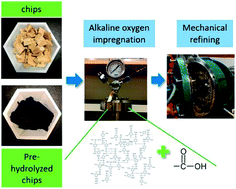Alkali–oxygen treatment prior to the mechanical pulping of hardwood enhances enzymatic hydrolysis and carbohydrate recovery through selective lignin modification
Abstract
Aspen chips were impregnated with sodium carbonate (70 °C, overnight) and oxygen (110 °C, 2 hours) prior to pre-steaming (190 °C, 15 min) and mechanical refining. This pretreatment protocol resulted in the removal of 44% of the lignin while retaining 55% of the hemicellulose (which was enriched with carboxylic acid groups (78 mmol kg−1)) in the water-insoluble fraction. Lignin removal/modification improved fiber swelling and increased cellulose accessibility, resulting in a biomass substrate that could be readily hydrolyzed (80% cellulose hydrolysis, 100% xylan hydrolysis) at an enzyme loading of 20 mg g−1 cellulose. To further enhance the recovery of the hemicellulose component and the susceptibility of the water-insoluble fraction to enzymatic hydrolysis, a pre-hydrolysis (170 °C, 1 hour) step was added prior to alkali–oxygen impregnation. This resulted in a total recovery of 72% of the original hemicellulose from both the solid and liquid fractions. Alternatively, lowering the steaming temperature to 130 °C resulted in the preservation of 72% of the hemicellulose in the water insoluble fraction. Although less lignin was removed at the lower, 130 °C temperature, the resulting lignin contained a greater amount of acid groups (107 mmol of carboxylic acid groups per kg). Substrates containing lignin which were enriched in acid groups showed increased swelling and a decrease in the tendency of the lignin to bind enzymes through hydrophobic interactions. This substantially reduced the negative effects of lignin on enzymatic hydrolysis.



 Please wait while we load your content...
Please wait while we load your content...